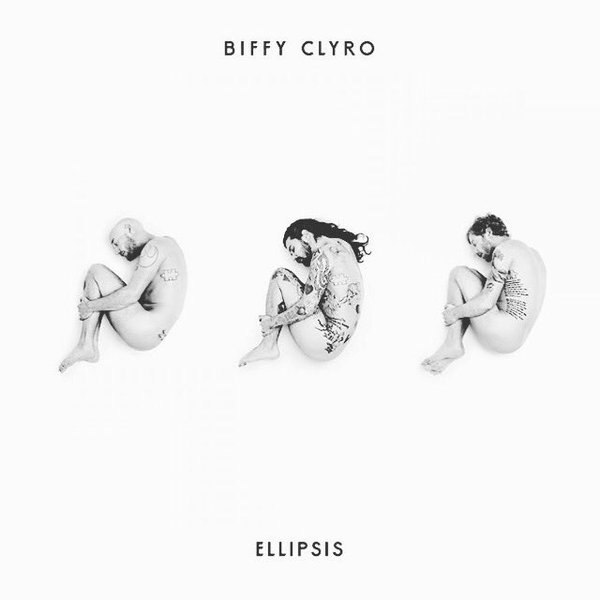ELLIPSIS by Biffy Clyro

Genre: Alternative Rock
Favorite Tracks: “Friends and Enemies,” “Animal Style,” “Herex,” “Flammable,” “On A Bang,” “Don’t Won’t Can’t,” “In The Name of the Wee Man”
The year was 2009. I tuned into MTV UK to kill a few minutes before dinner when Biffy Clyro’s “Many Of Horror” started playing. Frontman Simon Neil wailed through the song’s chorus, and twins Ben and James Johnston carried a roaring vocal harmony. Dumbfounded, I couldn’t believe that I had discovered a contemporary rock act that successfully blended a vice-like rhythm section with the explosive crescendos of the best grunge acts. But after being a band for three decades now, Biffy Clyro are also veering closer to the superstardom of Brit-rock contemporaries Muse and Oasis. Though if one thing can be relied on, it’s that this Scottish trio won’t play by template.
In a way, Biffy Clyro accomplished everything a rowdy Scottish garageband could have dreamt up. With their latest three albums, PUZZLE, ONLY REVOLUTIONS, and OPPOSITES, the trio sequentially edged themselves further from the spastic, noisy tonality of their first three releases, opting for more radio friendly arena rock fare. With the orchestral opulence of OPPOSITES — an album that I still admittedly consider their worst entry to date — they firmly planted themselves in the hearts and minds of the British rock scene. With that, Biffy Clyro’s seventh LP, ELLIPSIS, felt like a pivotal moment for them as a band. Time to try something new. Tone down the luscious production value, return to their roots, and start experimenting.
But in short, here’s the rub: ELLIPSIS is Biffy Clyro’s best album since PUZZLE. This album is angry, frustrated, and angsty as all hell. I read stories of loss and heartbreak here, constantly framed around the unhinged spirit of Simon Neil’s psyche. Is it as important to the band as OPPOSITES? No, of course not. It’s far more internal and less hell-bent on being an album for headlining festivals. Does it feature as many chart-topping singles as ONLY REVOLUTIONS? No, but the songwriting here harkens back to the intricacy of when they were still considered a post-hardcore act. Creatively uninhibited and featuring subtle trap beats, this is Biffy Clyro at their most audacious in years, ushering in their third chapter of three-album cycles, inspired by the likes of Kanye West, Kendrick Lamar, A$AP Rocky, and countless 80s rock acts.
It’s clear that Neil and the Johnston twins made it a point to channel the youthful exuberance that was devoid in OPPOSITES. This sentiment is wonderfully echoed at the start of the album through the distant sound of Neil laughing, followed by an exclamation of “record this!” With the intro track “Wolves of Winter,” we have Ben Johnston playfully experimenting with drum patterns that the band had never explored before. It’s loud, explosive, and constantly shapeshifting. Instrumentally, this track represents everything that ELLIPSIS ultimately signifies. The lyrics here aren’t quite on par, reading more like disingenuous angst rather than raw emotion. But thankfully Neil compensates for this half-baked lyrical work throughout the rest of the album.
Tracks “Friends and Enemies,” “Animal Style,” “Herex,” and “Flammable” are absolute dynamite tracks, sizzling through their four minutes like a burning match speeding down a highway. Here, Biffy Clyro are on their rhythmic A-game. Simon Neil’s guitar work has always been deceptively complex, shimmering with open chord work and toying with almost atonal melodies. In ELLIPSIS, this style is best seen in Neil’s solos, but takes a backseat during verses and choruses in order to let the rhythm section shine. James Johnston’s bass feels more important than ever, carrying the weight of these tracks, and the twins’ backing vocals are at a career high, allowing for some absolutely marvelous harmonizations.
The complex beat structure that gave Biffy Clyro their signature style in songs like “Living is a Problem” is still present but not quite as common. Instead, the occasional use of an 808 drum machine does serve as somewhat of a limitation to how unexpected the rhythm can play out, but it makes for some fascinatingly complex vocal alignments that willfully play against the grain of the instrumental section, notably on the bridge of “Friends and Enemies” and the entirety of “On A Bang,” a roaring old-school Biffy track that harkens back to the stylings of VERTIGO OF BLISS.
Acoustic track “Medicine” is admittedly lazy for Simon’s standards, but reads like one of the most personal tracks in the band’s catalogue. Chronicling depression and substance abuse, the instrumental work here feels intentionally stripped down from the far more elaborate guitar work of former album ballad “Many of Horror,” and doesn’t have the catchy ring of “Machines” or “God & Satan.” For part of the album’s middle half, Biffy Clyro naysayers need not apply.
However, the first of the album’s three acoustic pieces on the album, “Re-arrange” feels like an aptly titled departure from many of Biffy Clyro’s softer songs. In a quiet falsetto, Neil’s vocal work shines in a way that it hasn’t since “Diary of Always” — arguably Biffy Clyro’s best ballad — but what really turns it around is the instrumental work. This is a song that fervently refuses to attribute itself to an alternative rock act. It’s poppy, melancholy, and devoid of the heavy drumming that defines Biffy Clyro’s style. This is more SIA than SOUNDGARDEN, more CHVRCHES than THE PIXIES.
While tracks “Howl” and “People” are mostly inoffensive, perfectly competent Biffy Clyro songs, the sore thumb of the album is “Small Wishes,” a song that I have been desperately trying to enjoy, but just can’t figure out. With a beautifully complex country western-stylized guitar part, it’s easily one of the most instrumentally intuitive tracks. But it’s undeniable that the song feels woefully out of place in the album’s narrative coherency. Since ELLIPSIS is clearly Biffy Clyro flexing their genre muscles, bending the rules of what a grunge band should or should not be doing, I welcome the experiment, but I can’t deny that “Small Wishes” feels better suited for a B-sides album, especially since Biffy Clyro are so welcoming of releasing B-sides alongside every LP anyway.
What resolutely redeems any occasional pitfalls along the way is “Don’t, Won’t, Can’t.” This might be one of Biffy Clyro’s finest moments in their seven-LP career. With a shiny, 80s guitar track to ring in the song, we get a funky, rock track that showcases a side of Biffy Clyro’s originality that I haven’t seen since I first heard their 2004 track, “Some Kind of Wizard.” Even the most steadfast Biffy Clyro critic will have to admit that there is a magical level of rhythmic complexity in the balance of instrumental and vocal prowess here, boasting what might be the most cathartic build-up in the bands resume.
Closing ELLIPSIS is “In the Name of the Wee Man,” a PUZZLE-era track that understands that complex guitar work isn’t always dependent on melodic structuring, but rhythmic precision. A perfect bookend to “Wolves of Winter,” ELLIPSIS’s closing track isn’t exactly the most inventive Biffy Clyro song, but it reminds listeners just how synchronized Simon Neil and the Johnstons are when it comes to raw energy. Oddly enough, this track, along with “Don’t, Won’t, Can’t,” are only featured on the album’s deluxe edition, making for a head-scratching omission.
Everything feels more loose and less calculated in ELLIPSIS. A balls-to-the-wall, 100mph declaration of the band’s return to form. Biffy Clyro no longer need to cater to an audience to reach the top of the Brit-rock charts. Muse certainly still holds a certain regard in the realm of arena rock, but Biffy Clyro have made it undoubtedly clear that they are willing to challenge their audience and themselves in a far more compelling fashion. Here, we have a band that’s willing to pay tribute to Tears for Fears, channel their guitar gurus Pantera, but still toy with the notions of hip hop’s production values. For what it’s worth, this makes them the foremost artist in the scene, so I can remain proud of their tattoo that’s embedded on my back.
Verdict: Recommend



